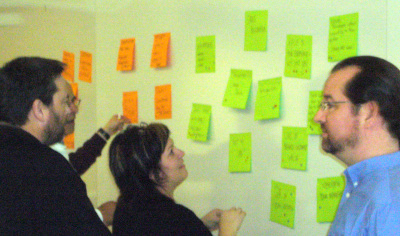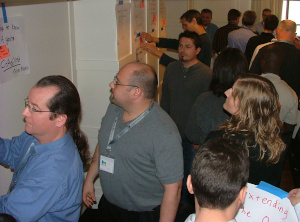 Nominal Group Technique (NGT) is a facilitation tool that helps a group quickly build a comprehensive list of ideas, issues, options or solutions, and then select the best one(s). NGT works faster than traditional brainstorming, yet generates more complete and higher quality results. NGT prevents the quieter voices from being overwhelmed and allows each participant to contribute to their full potential.
Nominal Group Technique (NGT) is a facilitation tool that helps a group quickly build a comprehensive list of ideas, issues, options or solutions, and then select the best one(s). NGT works faster than traditional brainstorming, yet generates more complete and higher quality results. NGT prevents the quieter voices from being overwhelmed and allows each participant to contribute to their full potential.
The Nominal Group Technique was developed in the 1970’s by Andre Delbecq and Andrew H. Van de Ven. The effectiveness of NGT has been validated by subsequent research.
Let’s see how NGT can be used by a scrum team to create working agreements for their scrum events and other meetings. Such agreements are often called meeting ground rules.
Read the full article…




 Want to know a secret to making decisions that will lead to better outcomes? Not so fast. Well actually, not too soon. The timing of when you make your decision will have a big impact on how well things work out.
Want to know a secret to making decisions that will lead to better outcomes? Not so fast. Well actually, not too soon. The timing of when you make your decision will have a big impact on how well things work out.  Organizations that are scaling up with scrum often find that
Organizations that are scaling up with scrum often find that  Everyone is super busy, yet things take forever to get done. I encounter this at organizations that are scaling up with scrum. All too often, leaders want to jump to a solution, such as implementing a scaling framework. Sadly, implementing a ‘fix’ without a deep understanding of the causes of the problem will likely make things worse. Blindly implementing the framework will make people even busier and things will take even longer to get done.
Everyone is super busy, yet things take forever to get done. I encounter this at organizations that are scaling up with scrum. All too often, leaders want to jump to a solution, such as implementing a scaling framework. Sadly, implementing a ‘fix’ without a deep understanding of the causes of the problem will likely make things worse. Blindly implementing the framework will make people even busier and things will take even longer to get done.
 A great way to continue your agile learning journey is attending conferences. You’ll learn, build your professional network, and earn SEUs to renew your scrum certifications. To make the conference selection process easier, or harder, we’ve published
A great way to continue your agile learning journey is attending conferences. You’ll learn, build your professional network, and earn SEUs to renew your scrum certifications. To make the conference selection process easier, or harder, we’ve published  Nominal Group Technique (NGT) is a facilitation tool that helps a group quickly build a comprehensive list of ideas, issues, options or solutions, and then select the best one(s). NGT works faster than traditional brainstorming, yet generates more complete and higher quality results. NGT prevents the quieter voices from being overwhelmed and allows each participant to contribute to their full potential.
Nominal Group Technique (NGT) is a facilitation tool that helps a group quickly build a comprehensive list of ideas, issues, options or solutions, and then select the best one(s). NGT works faster than traditional brainstorming, yet generates more complete and higher quality results. NGT prevents the quieter voices from being overwhelmed and allows each participant to contribute to their full potential.